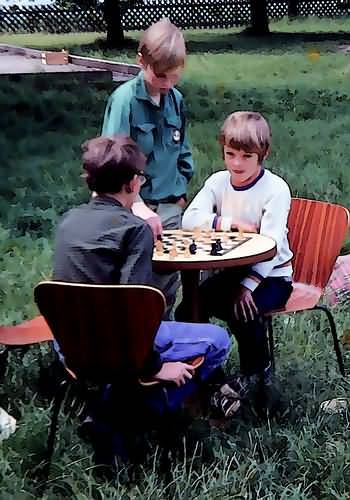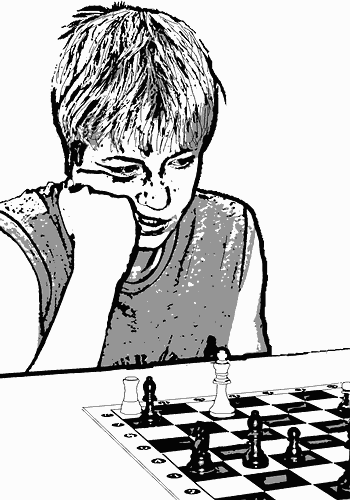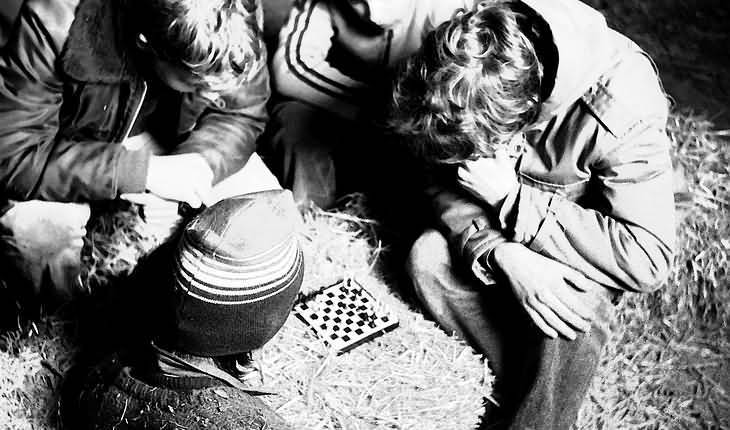source: www.youthwork-practice.com | 2000 Games, Devotions, Themes, Ideas and more for Youth Work
only for private using
Chess - more than just a game

chess tournament in the youth group
©: www.youthwork-practice.com
Chess is only for the super-smart? Too hard for kids?
My father said that chess was too hard, and I was too young. And still wanted to learn it, and he taught me. In the beginning, I always lost, but I was able to play chess from early on.
So, I assume that everyone can learn to play chess, even at an early age. There are even chess projects in kindergartens where children playfully learn the game. And if certain age groups play together, the result will be balanced. Children do not necessarily have to compete with adults and long-time chess players. And equally, no teenager should play against a chess grandmaster, even though one could certainly learn one or two opening moves from them.
Chess is a social game, it is quiet and calming – and it helps even the brightest kids to calm down when they immerse themselves in chess.
So, what are the educational benefits of playing chess?
Some educational aspects explain why playing chess would be beneficial for children and teenagers. I would like to list some valuable facts here.

Some educational benefits of playing chess with children
©: www.youthwork-practice.com
-
Chess promotes concentration.
-
Chess promotes sociability.
-
Chess allows one to come to rest. Calming down in our hectic world can never hurt.
-
Chess promotes learning and developing problem-solving strategies.
-
Chess encourages planning and thinking ahead. In the beginning, you just play and plan your next move. Later, you plan the next 3-4 moves in advance - depending on the opponent's possible moves.
-
Chess also promotes complex relationships. What is the opponent planning to do?
-
Of course, logical thinking and spatial thinking are also promoted.
-
Chess has a few simple rules. Learning to follow and sticking to those rules makes chess learnable even for kids who are not keen on rules.
-
When playing chess, every move has consequences. The chess player experiences success & failure and learns to process them. This increases self-confidence.
-
Learning social skills. Playing chess means playing with friends. Finding a partner to play against. Not to beat, not to fight fights, and still, develop fun in the game. A social gathering and still playing against each other, trying to get one's brain spinning to win.
-
Even if you are still watching people playing chess, you learn by observing and gain confidence over time.
-
Ultimately developing joy & motivation to play, taking on new challenges with new and old players.
Chess in the youth group
On camps, we always have chess boards with us. Whether indoors, outdoors, on the bus, on the beach, or out in the field: chess can be played anytime and anywhere. Even watching is fun - and those who are not yet proficient learn and think as they watch.

Playing chess with kids
©: www.youthwork-practice.com
Conducting a chess tournament
If you want to hold a small chess tournament in the youth group, you will need a certain number of chess boards and pieces, depending on the size of the group. Surely the participants can bring appropriate chess sets from home.
Depending on the number of players, it might not be possible for everyone to play against each other. In this case, you could form groups, where the winners play against the winners of the other groups on another day.
Who wins receives one point? Who has won the most games after 90 minutes? If you play fast, you can gather a lot of points in 90 minutes.
[ © www.youthwork-practice.com | 2000 Games and Ideas for Youth Work ]






